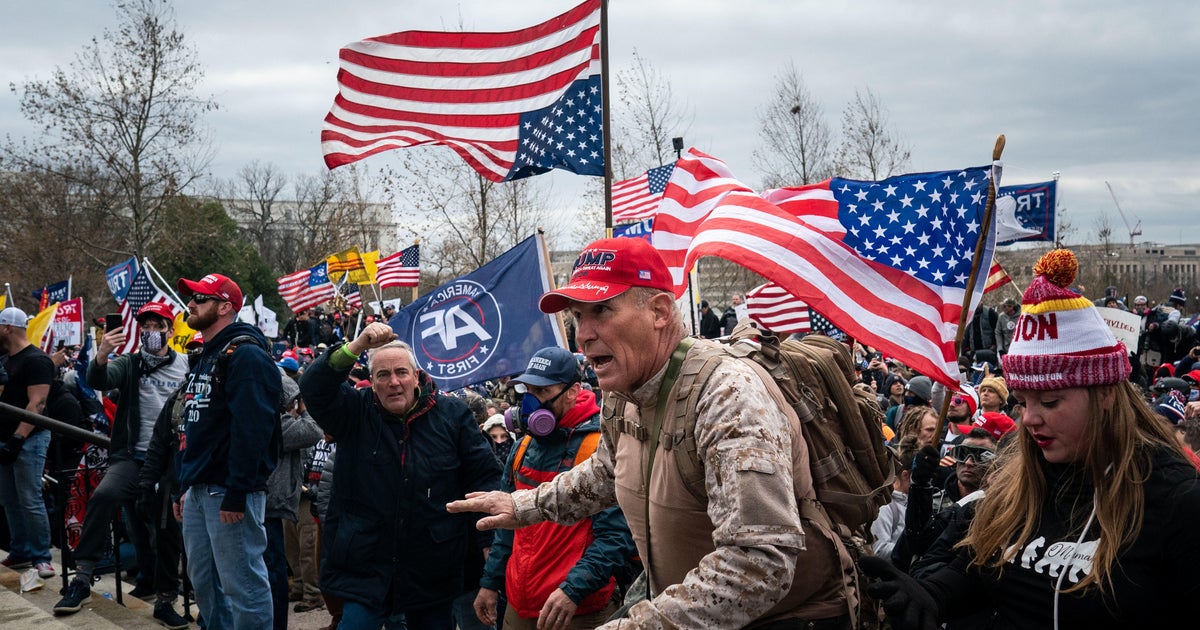
Washington — The Supreme Court on Friday ruled in favor of a former Pennsylvania police officer who was charged with obstructing an official proceeding after he entered the U.S. Capitol building on Jan. 6, 2021, and narrowed the Justice Department’s use of a federal obstruction statute leveled against scores of people who breached the building where Congress had convened to count state electoral votes.
The court ruled 6-3 in finding that to prove a violation of the obstruction law, the government must show that the defendant impaired the availability or integrity of records, documents or other objects used in an official proceeding. Justice Ketanji Brown Jackson joined five conservatives in the majority, while Justice Amy Coney Barrett sided with the two other liberals.
The case was sent back to the lower court for further proceedings, and the court said it can assess the sufficiency of the obstruction charge brought against defendant Joseph Fischer in light of its ruling.
The Supreme Court’s decision could affect the ongoing prosecutions of nearly 250 defendants charged with obstruction for their participation in the Jan. 6 assault. It could also upend cases that have already been adjudicated, since those who were convicted of violating the obstruction statute or pleaded guilty could seek resentencing, withdraw their pleas or ask for new trials. There are 52 cases in which a defendant was convicted and sentenced on charges where the obstruction count was the sole felony, and of those, 27 are currently incarcerated, according to the Justice Department.
Crucially, the ruling could also impact the federal prosecution of former President Donald Trump, who is facing charges stemming from an alleged scheme to overturn the results of the 2020 presidential election. The obstruction statute and conspiracy to obstruct an official proceeding are among the four counts Trump faces in the case brought by special counsel Jack Smith. Trump has pleaded not guilty to all charges.
While the impact on the Supreme Court’s ruling on Trump’s case was not immediately clear, the former president could ask a federal district court to toss out the two obstruction-related counts as a result. Smith told the Supreme Court in a filing in another case that regardless of the ruling in Fischer’s case, the obstruction charges against Trump are still valid because he is alleged to have organize false slates of electors, which involves documents.
In that case, the justices are still weighing a separate bid by Trump to have the entire indictment dismissed on the grounds of presidential immunity, though they have yet to issue a decision. The special counsel’s office declined to comment.
Attorney General Merrick Garland said he was “disappointed” by the decision, but said it would have a minimal impact on Jan. 6 cases.
“There are no cases in which the Department charged a January 6 defendant only with the offense at issue in Fischer. For the cases affected by today’s decision, the Department will take appropriate steps to comply with the Court’s ruling,” Garland said in a statement. “We will continue to use all available tools to hold accountable those criminally responsible for the January 6 attack on our democracy.”
Fischer v. U.S.
The law at the center of the case was passed in the wake of the Enron accounting fraud scandal and makes it a crime to “corruptly” obstruct or impede an official proceeding. The statute is typically used in cases that involve evidence tampering, since its first provision is focused on documents. But after the Jan. 6 attack, federal prosecutors leveled the obstruction charge against more than 350 defendants who allegedly entered the Capitol after Congress had convened to certify the election results.
More than 1,400 people have been charged in connection with the Jan. 6 assault. The vast majority — 82% — were not charged with violating the obstruction statute, according to the Justice Department.
One of those defendants who was charged is Fischer, who faced seven counts, including assaulting a police officer, disorderly conduct and corruptly obstructing an official proceeding. Violators of the obstruction statute face up to 20 years in prison.
Fischer moved to dismiss the obstruction count, and a federal district judge ruled that nothing in the indictment alleged that he “took some action with respect to a document, record, or other object” to obstruct the congressional proceedings.
That judge, U.S. District Judge Carl Nichols, was the only one out of 15 hearing Jan. 6 cases in Washington who adopted a narrow reading of the law.
The federal appeals court in Washington, though, ruled against Fischer in a divided decision last year. He then appealed to the Supreme Court, and Fischer’s case marked the first in which the justices confronted the aftermath of the Jan. 6 attack.
It was also one of three cases before the court in its current term with implications for Trump. Smith told the Supreme Court in a filing in the immunity case that regardless of its ruling in Fischer’s case, the obstruction charges against Trump are still valid.
The special counsel claims that Trump deceitfully organized fake slates of electors in seven battleground states and urged state officials to send the false certificates to Congress. The creation of those documents, Smith said, “satisfies an evidence-impairment interpretation.”
Robert Legare, Scott MacFarlane and Andres Triay contributed reporting.
